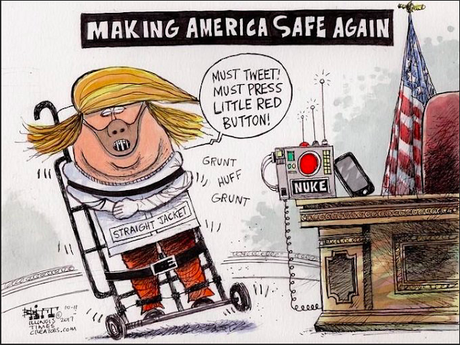 (Cartoon image is by Chris Britt in the Illinois Times.)
(Cartoon image is by Chris Britt in the Illinois Times.)Several months ago, Yale University Psychiatrist Dr. Bandy X. Lee edited a book by mental health professionals that made the case that Donald Trump was suffering from mental illness. In light of recent developments, Dr. Lee has written an article for Business Insider. Here is part of what he wrote:
Bob Woodward's new book, "Fear," describes a "nervous breakdown of Trump's presidency." Earlier this year, Michael Wolff's "Fire and Fury" offered a similar portrayal. Now, an op-ed in The New York Times by an anonymous "senior White House official" describes how deeply the troubles in this administration run and what effort is required to protect the nation. None of this is a surprise to those of us who, 18 months ago, put together our own public service book, "The Dangerous Case of Donald Trump: 27 Psychiatrists and Mental Health Experts Assess a President." My focus as the volume's editor was on Trump's dangerousness because of my area of expertise in violence prevention. Approaching violence as a public health issue, I have consulted with governments and international organizations, in addition to 20 years of engaging in the individual assessment and treatment of violent offenders. . . . My current concern is that we are already witnessing a further unraveling of the president's mental state, especially as the frequency of his lying increases and the fervor of his rallies intensifies. I am concerned that his mental challenges could cause him to take unpredictable and potentially extreme and dangerous measures to distract from his legal problems. Mental health professionals have standard procedures for evaluating dangerousness. More than a personal interview, violence potential is best assessed through past history and a structured checklist of a person's characteristics. These characteristics include a history of cruelty to animals or other people, risk taking, behavior suggesting loss of control or impulsivity, narcissistic personality and current mental instability. Also of concern are noncompliance or unwillingness to undergo tests or treatment, access to weapons, poor relationship with significant other or spouse, seeing oneself as a victim, lack of compassion or empathy, and lack of concern over consequences of harmful acts. The Woodward book and the New York Times op-ed confirm many of these characteristics. The rest have been evident in Trump's behavior outside the White House and prior to his tenure. That the president has met not just some but all these criteria should be reason for alarm. Other ways in which a president could be dangerous are through cognitive symptoms or lapses, since functions such as reasoning, memory, attention, language and learning are critical to the duties of a president. He has exhibited signs of decline here, too. Furthermore, when someone displays a propensity for large-scale violence, such as by advocating violence against protesters or immigrant families, calling perpetrators of violence such as white supremacists "very fine people" or showing oneself vulnerable to manipulation by hostile foreign powers, then these things can promote a much more widespread culture of violence. The president has already shown an alarming escalation of irrational behavior during times of distress. Others have observed him to be "unstable," "losing a step," and "unraveling." He is likely to enter such a state again. Violent acts are not random events. They are end products of a long process that follow recognizable patterns. As mental health experts, we make predictions in terms of unacceptable levels of probability rather than on the basis of what is certain to happen. Trump's impairment is a familiar pattern to a violence expert such as myself, but given his level of severity, one does not need to be a specialist to know that he is dangerous. I believe Woodward's book and the revelations in the New York Times op-ed have placed great pressure on the president. We are now entering a period when the stresses of the presidency could accelerate because of the advancing special counsel's investigations. The degree of Trump's denial and resistance to the unfolding revelations, as expressed in a recent Fox interview, are telling of his fragility. From my observations of the president over extended time via his public presentations, direct thoughts through tweets and accounts of his close associates, I believe that the question is not whether he will look for distractions, but how soon and to what degree. At least several thousands of mental health professionals who are members of the National Coalition of Concerned Mental Health Experts share the view that the nuclear launch codes should not be in the hands of someone who exhibits such levels of mental instability. Just as suspicion of crime should lead to an investigation, the severity of impairment that we see should lead to an evaluation, preferably with the president's consent.

